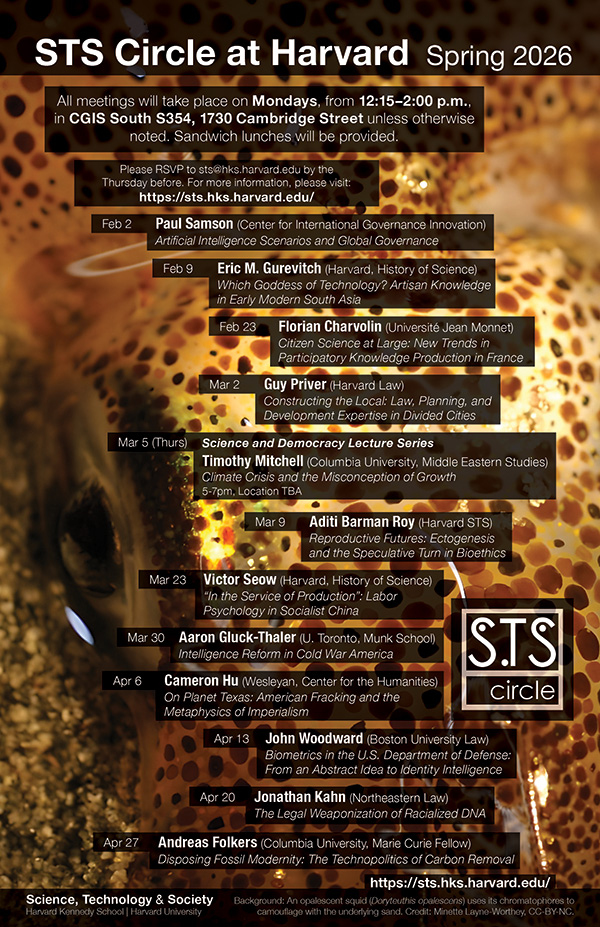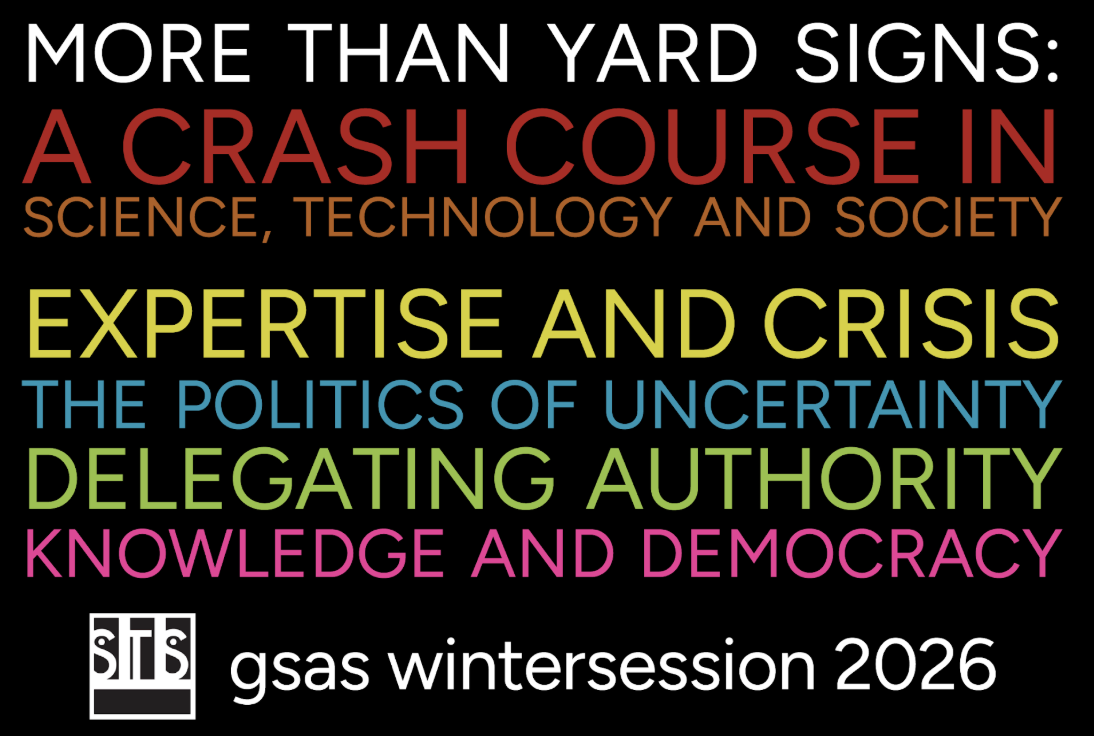Program on Science, Technology and Society at HarvardHarvard Kennedy School of Government | Harvard University |
|||||||
|
|
EventsSTS CircleThe STS Circle at Harvard meets weekly during the academic semester. For Fall 2025, all meetings are planned to take place in person on Mondays, from 12:15-2:00 p.m., in CGIS South S354, 1730 Cambridge Street unless otherwise noted. Sandwich lunches will be provided. To receive the abstract and bio for each talk, and to register to attend, please join our mailing list. Spring 2026Feb. 2: Paul Samson (Center for International Governance Innovation)
Artificial Intelligence Scenarios and Global Governance Feb. 9: Eric M. Gurevitch (Harvard, History of Science)
Which Goddess of Technology? Artisan Knowledge in Early Modern South Asia Feb. 23: Florian Charvolin (Université Jean Monnet)
Citizen Science at Large: New Trends in Participatory Knowledge Production in France Mar. 2: Guy Priver (Harvard Law)
Constructing the Local: Law, Planning, and Development Expertise in Divided Cities Mar. 9: Aditi Barman Roy (Harvard STS)
Reproductive Futures: Ectogenesis and the Speculative Turn in Bioethics Mar. 23: Victor Seow (Harvard, History of Science)
"In the Service of Production": Labor Psychology in Socialist China Mar. 30: Aaron Gluck-Thaler (U. Toronto, Munk School)
Intelligence Reform in Cold War America Apr. 6: Cameron Hu (Wesleyan, Center for the Humanities)
On Planet Texas: American Fracking and the Metaphysics of Imperialism Apr. 13: John Woodward (Boston University Law)
Biometrics in the U.S. Department of Defense: From an Abstract Idea to Identity Intelligence Apr. 20: Jonathan Kahn (Northeastern Law)
The Legal Weaponization of Racialized DNA Apr. 27: Andreas Folkers (Columbia University, Marie Curie Fellow) Disposing Fossil Modernity: The Technopolitics of Carbon Removal » More information and past schedules Science & Democracy Lecture SeriesOnce a semester, the STS Program, with co-sponsorship from other local institutions, hosts an installation in its Science and Democracy Lecture Series. In the face of climate catastrophe, why have existing conceptions of collective life appeared so impervious to critique? One concept stands out: the idea of the economy and our preoccupation with its continued growth. For most people, including its critics, economic growth appears as the inevitable movement of capitalist society, driven by a process of technological improvement or an endless accumulation of capital. It is almost never connected to capitalization, or the capitalist modes of indebting and extracting payment from the future. Growth is better understood as a device for securing the repayment of debt. This does not make it any less damaging to collective well-being. But it does allow growth to be grasped not as the inevitable movement of capitalist development but as a more recent arrangement that arises from—rather than simply causing—a mode of living at the expense of the future. Co-sponsored by Harvard University Weatherhead Center for International Affairs, Harvard University Center for the Environment (A Center of the Salata Institute), and the McQuillan Institute. Workshops and Panels
This J-term workshop brings together students from across the University to explore the interplay between knowledge, expertise, and democratic decision-making. It addresses how questions of power, policy, law, and politics play out in tandem with scientific and technological developments. Sessions introduce foundational concepts from the discipline of Science and Technology Studies (STS) to analyze the institutional and political authority of science and technology in contemporary societies. Over three days, we will explore how societies can seek to construct reliable forms of knowledge in an era plagued by skepticism, distrust of authority, and political polarization. Post-Enlightenment, societies counted on science and technology to provide democratically acceptable justifications for policy decisions. The complexities of contemporary social problems motivated widespread delegations of power to experts. Yet the same sciences and technologies have increasingly come to be perceived as “the problem” rather than “the solution.” For example, as modern technologies have decentralized information provision more than ever before, expert claims have become increasingly contested. Rifts concerning facts accompany growing political polarization, especially in the United States. To make sense of contemporary frictions and future avenues for democratic governance, participants will work together to discuss a set of readings, current controversies from recent news articles, and each other’s research-in-progress. No prior experience in STS required. » Workshops and panels archive Program newsSTS Fellow Pariroo Rattan recently defended her dissertation, "A Marketplace for Populism: The Moral Politics of Digitization in India's Informal Economy," joining Nicole and Hilton to complete our trio of outstanding newly minted doctors. Congratulations to our extraordinary STS Fellows Nicole West Bassoff and Hilton Simmet, the first graduates to hold a PhD in Public Policy on the Science, Technology and Policy Studies track! Nicole's dissertation is titled "Can Cities Be Smart? Urban Governance in the Digital Age," and Hilton's is "Just Economics: Inequality and Political Culture in Cross-National Perspective." Two STS Undergraduate Fellows received a Hoopes Prize for their senior theses — Katie Burstein with “The Body Restored: Constructions of the Patient in the Cult of Asclepius,” and Emil Massad with “We Never Said You Weren’t Exposed: Risk in the Aftermath of the Train Derailment in East Palestine, Ohio.” Join us for the Global Observatory for Genome Editing International Summit on May 21-23. Register and learn more here. Register here for a panel discussion on April 24 regarding recent changes to federal research funding, co-hosted with the Harvard Griffin GSAS Science Policy Group. The 2025 STS Undergraduate Essay Prize contest is now open. Submissions are due here by April 14, 2025. The 2025-2026 STS Fellows application is now OPEN. Application deadline has been extended to March 14, 2025. Register to attend the launch symposium on October 25 for the McQuillan Institute for Science, Technology and the Human Future. Sheila Jasanoff was honored with the Phi Beta Kappa Alpha Iota Excellence in Teaching prize. Congratulations to the winner of the STS Undergraduate Essay Prize, Andrew Charroux, and to the honorable mentions, Joshua Fang and Maya Rosen! Watch videos here to learn more about their winning papers. |
||||||


